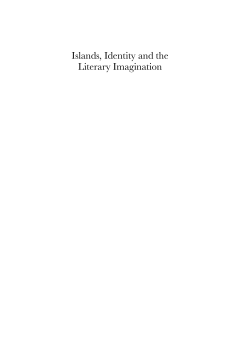
Additional Information
Book Details
Abstract
Australia is the planet’s sole island continent. This book argues that the uniqueness of this geography has shaped Australian history and culture, including its literature. Further, it shows how the fluctuating definition of the island continent throws new light on the relationship between islands and continents in the mapping of modernity. The book links the historical and geographical conditions of islands with their potent role in the imaginary of European colonisation. It prises apart the tangled web of geography, fantasy, desire and writing that has framed the Western understanding of islands: their real and material conditions and their symbolic resonance from antiquity into globalised modernity. The book also traces how this spatial imaginary has shaped the modern 'man' who is imagined as being the island's natural inhabitant or mirror. Importantly, the book challenges these habits of thought by their relocation within larger topological and imaginary visions from islanders themsleves.
Elizabeth McMahon is Associate Professor in the School of the Arts and Media at the University of New South Wales.
‘In this magisterial work are the stories and imaginaries, along with their gripping critical analyses, that prove how “utterly compelling, beautiful and devastating” island experiences are.’ —Godfrey Baldacchino, Pro-Rector, University of Malta and President, International Small Islands Studies Association.
‘This elegant and inspiring book transforms our understanding of Australian literature in light of the shifting cartographies of global modernity.’ —Robert Dixon, Professor of Australian Literature, University of Sydney.
"This is a ravishing book, exciting, enervating, from one of the leading voices in Australian criticism. Attractive and accessible in its language, it revels in the intellectual demands occasioned by deep awareness of the island continent, and provides access for our own revelations about the interplay of topography, lived experience, and the imagination. [It] beautifully illustrates the exceptionalism of Australia as a space. —Dr. Ian Henderson, King’s College London
Australia is the planet’s sole island continent. This book argues that the uniqueness of this geography has shaped Australian history and culture, including its literature. Further, it shows how the fluctuating definition of the island continent throws new light on the relationship between islands and continents in the mapping of modernity. The book links the historical and geographical conditions of islands with their potent role in the imaginaries of European colonisation. It prises apart the tangled web of geography, fantasy, desire and writing that has framed the Western understanding of islands, both their real and material conditions and their symbolic power, from antiquity into globalised modernity. The book also traces how this spatial imaginary has shaped the modern 'man' who is imagined as being the island's mirror. The inter-relationship of the island fantasy, colonial expansion, and the literary construction of place and history, created a new 'man': the dislocated and alienated subject of post-colonial modernity.
This book looks at the contradictory images of islands, from the allure of the desert island as a paradise where the world can be made anew to their roles as prisons, as these ideas are made concrete at moments of British colonialism. It also considers alternatives to viewing islands as objects of possession in the archipelagic visions of island theorists and writers.
It compares the European understandings of the first and last of the new worlds, the Caribbean archipelago and the Australian island continent, to calibrate the different ways these disparate geographies unifed and fractured the concept of the planetary globe. In particular it examines the role of the island in this process, specifically its capacity to figure a 'graspable globe' in the mind.
The book draws on the colonial archive and ranges across Australian literature from the first novel written and published in Australia (by a convict on the island of Tasmania) to both the ancient dreaming and the burgeoning literature of Aboriginal and Torres Strait Islanders in the twenty-first century. It discusses Australian literature in an international context, drawing on the long traditions of literary islands across a range of cultures. The book's approach is theoretical and engages with contemporary philosophy, which uses the island and the archipleago as a key metaphor. It is also historicist and includes considerable original historical research.
Table of Contents
| Section Title | Page | Action | Price |
|---|---|---|---|
| Front Matter | i | ||
| Half Title | i | ||
| Series | ii | ||
| Title | iii | ||
| Copyright | iv | ||
| Contents | v | ||
| Illustrations | vii | ||
| Acknowledgements | ix | ||
| Chapters | 1 | ||
| Section 1: Islands Real and Imaginary | 1 | ||
| Introduction | 3 | ||
| Chapter 1: What’s in a Metaphor: ‘No Man Is an Island’ | 19 | ||
| Section 2: Islands: Making the Planet, World, Globe | 45 | ||
| Chapter 2: The First and Last of New Worlds: The Caribbean and Australia | 47 | ||
| Chapter 3: Insular and Continental Interiors: The Shifting Map of Literary Universalism after the War | 87 | ||
| Section 3: Dreams and Nightmares | 131 | ||
| Chapter 4: Accidents of Empire: Shipwrecks and Castaways | 133 | ||
| Chapter 5: The Best and Worst of Times: Utopias, Dystopias, Archipelagos | 177 | ||
| Back Matter | 205 | ||
| Appendix: Colonial Ties between the West Indies and Australia | 205 | ||
| Notes | 253 | ||
| Works Cited | 261 | ||
| Index | 289 |
